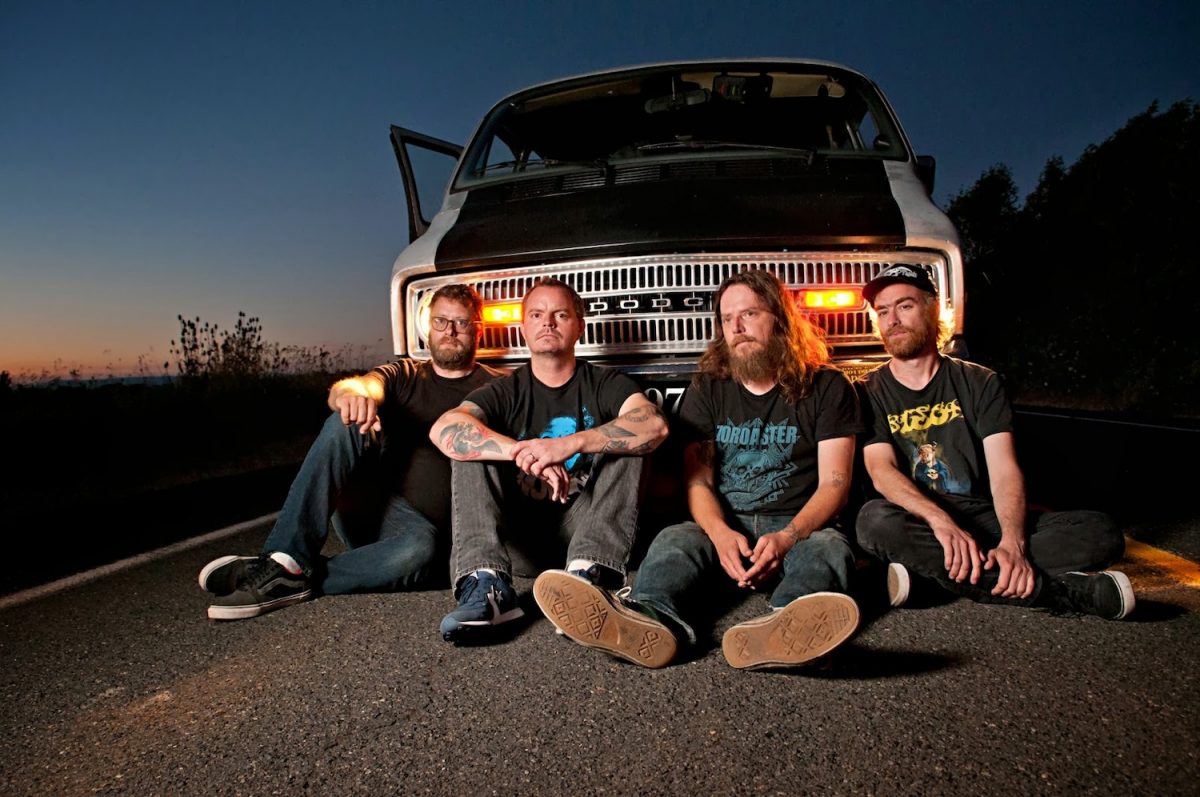
Red Fang’s latest stoner opus, Whales And Leeches, neither sinks nor sucks
“We’re a pretty dark band—I don’t see this record getting a lot of radio play.”
There’s a warmth in the voice of Bryan Giles, guitarist for Portland, Ore., band Red Fang, that belies his group’s darkness. The band is on the precipice of releasing its third album, Whales And Leeches (Relapse), after a summer raging across the festivals and rock clubs of Europe. Through a series of hilarious viral videos and years of intensely cathartic, energetic shows, the group has earned a reputation as one of heavy music’s premier party bands—whether it wants that title or not.
“I think our videos make us seem like party guys—and I guess this is subjective, but I think we’re on a pretty dark bend,” says Giles. “It’s not depressing, but we mine some pretty dark feelings. If people react by partying, that’s great. [Laughs] I want people to react somehow.”
And react they have. It may be due to the fact that, regardless of Giles’ claims, the band is equal parts fun and dark. While inherently heavy and sonically adventurous, at the heart of every Red Fang album, there are massive hooks and fist-in-the-air choruses that are among the most accessible—and unshakable—in the underground. In a scene fractured into infinite subgenres, each testing the realms of listenability in their own way, Red Fang stakes its territory on universality. It doesn’t matter how “kvlt” you are; if you’ve ever loved heavy music, you’ll get it.
“I don’t describe us as heavy metal,” says Giles. “I try not to describe us at all—we’re a rock ‘n’ roll band … in high school that was the clique, and if you didn’t know all about heavy metal, you weren’t invited, you know what I mean? Just freaking out over something that was so angry—I think that’s a personality type that reacts that way, and they’re our people, these folks going out, throwing beer everywhere. I can relate.”
The darkness and anger of Whales And Leeches is very human, very adult, very real, and it stands in stark contrast to the cartoonish, petulant temper-tantrums of the band’s more extreme peers. Coupled with the sophisticated grooves and domineering riffs on tracks like “Voices Of The Dead,” “Dawn Rising” and “Blood Like Cream,” these grim vibes make for that most rare of beasts: the album that is as mature as it is invigorating, as deep as it is visceral.
“We were all in these real complicated bands for years and years,” says Giles, “and it was fun to play, but I don’t think anybody liked it. [Laughs] And so that’s always been our goal: Write songs that are entertaining as a musician, but write songs that are listenable, that hopefully are songs you want to listen to more than once. I don’t dig through my record collection for things that I can’t remember anymore, you know what I mean? I go back and listen to the stuff that really stuck in my head. Albums like Suicidal Tendencies, their first record. It’s crazy—I won’t listen to that record for years, and I’ll put it on and know every freaking lyric. And it surprises me; I’m like, ‘Where the hell did I store this information?’ I thought I was busy killing brain cells, and yet that’s still floating around in there. That’s the sign of a good record, and that’s the kind of record we want to make.”
But being Red Fang isn’t just about crushing beers and recalling classic hardcore records. As the band’s reputation has grown, so have expectations. Unlike previous efforts, Red Fang now has a large international following and a record label footing the bill, with the Decemberists’ Chris Funk sitting in the producer’s chair and Grammy winner Vance Powell behind the mixing board. The band managed to reunite the team that crafted Red Fang’s breakthrough, but it only had three months in between tours to write and record Whales And Leeches—a challenge after the leisurely pacing of earlier records.
“None of us have ever written a record under pressure before,” says Giles. “Even (sophomore album) Murder The Mountains, we took our time. We had a one-record deal with Sargent House (for the self-titled debut), so there was no one breathing down our necks to put something out. And we recorded that one on our own dime, so there were no time constraints. This time, definitely, everyone was kind of freaking out, myself included. But I tried not to voice my concerns, because what’s the good in that? It’ll just make everyone else more freaked out.”
Red Fang’s writing technique, however, provides a degree of consistency—a degree of confidence—that doesn’t always happen when a band starts from scratch with each new record, allowing for a natural progression and evolution. The group is very self-referential, mining rehearsal tapes for moments that may have not worked in the past—“some of those riffs, like ‘Hank Is Dead’ were completed at least four years before it was recorded,” Giles notes—but make sense now. It creates a sense of continuity that underscores the band’s commitment to quality.
“Some of the songs off that new record, I thought, ‘Well, this is not going to make the record,’ and, ‘I like it, but it’s just too weird,’” says Giles. “Like ‘Voices Of The Dead’—that riff is pretty bizarre. It’s not crazy or anything, it just gets weird; so the structure of the song is a little, uh, different. But that didn’t surprise me, you know—we’re very collaborative, and if someone gets stumped, someone else picks it up and runs. I think it’s important for us to maintain the vibe.”
And in that, Whales And Leeches is a monumental success—a clear line from Red Fang’s earliest recordings to its latest, but it also displays a band that has grown and progressed. Fans who signed on with 2008’s “Prehistoric Dog” are going to find themselves right at home with tracks like the soaring “Crows In Swine,” and new fans drawn in by the hypnotic grooves of “Every Little Twist” and the unmitigated onslaught of “1516” are lucky enough to have two albums to satisfy their inevitable need for another Fang fix. Whether the band revisits its viral successes and conquers the internet a third time remains to be seen, but that’s a secondary concern for artists and label alike.
“It was scary, but as far as hits go, it’s Relapse Records—they go for some of the craziest shit in the world,” says Giles. “I don’t think they would have been bummed if we put out something very esoteric, but that’s not where our heads are.”
—Sean L. Maloney







